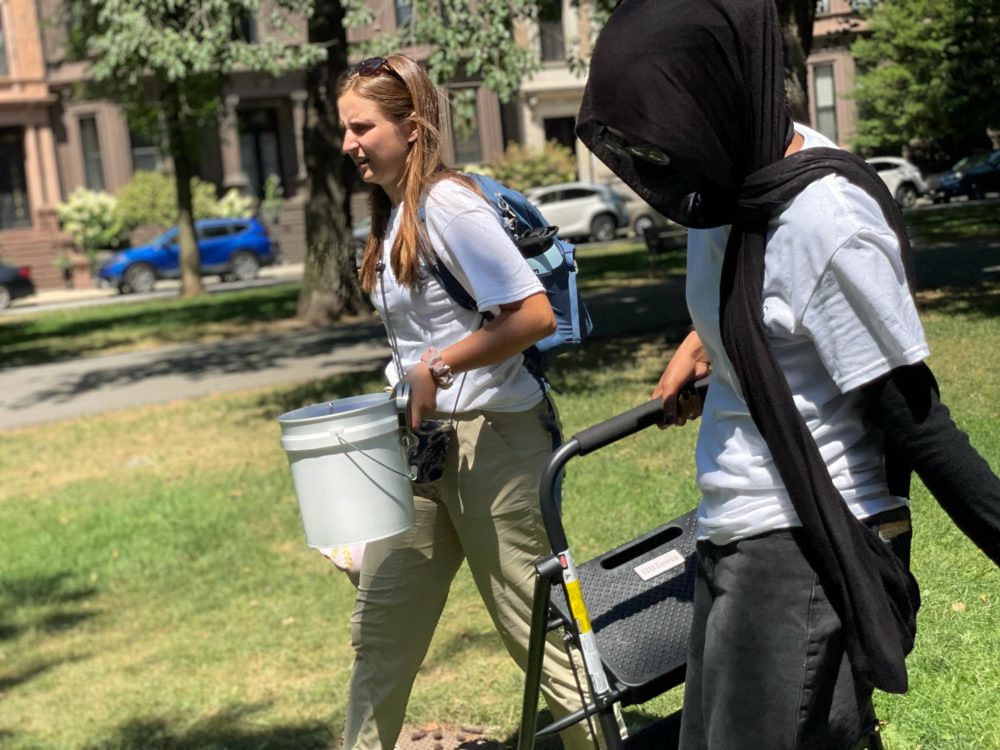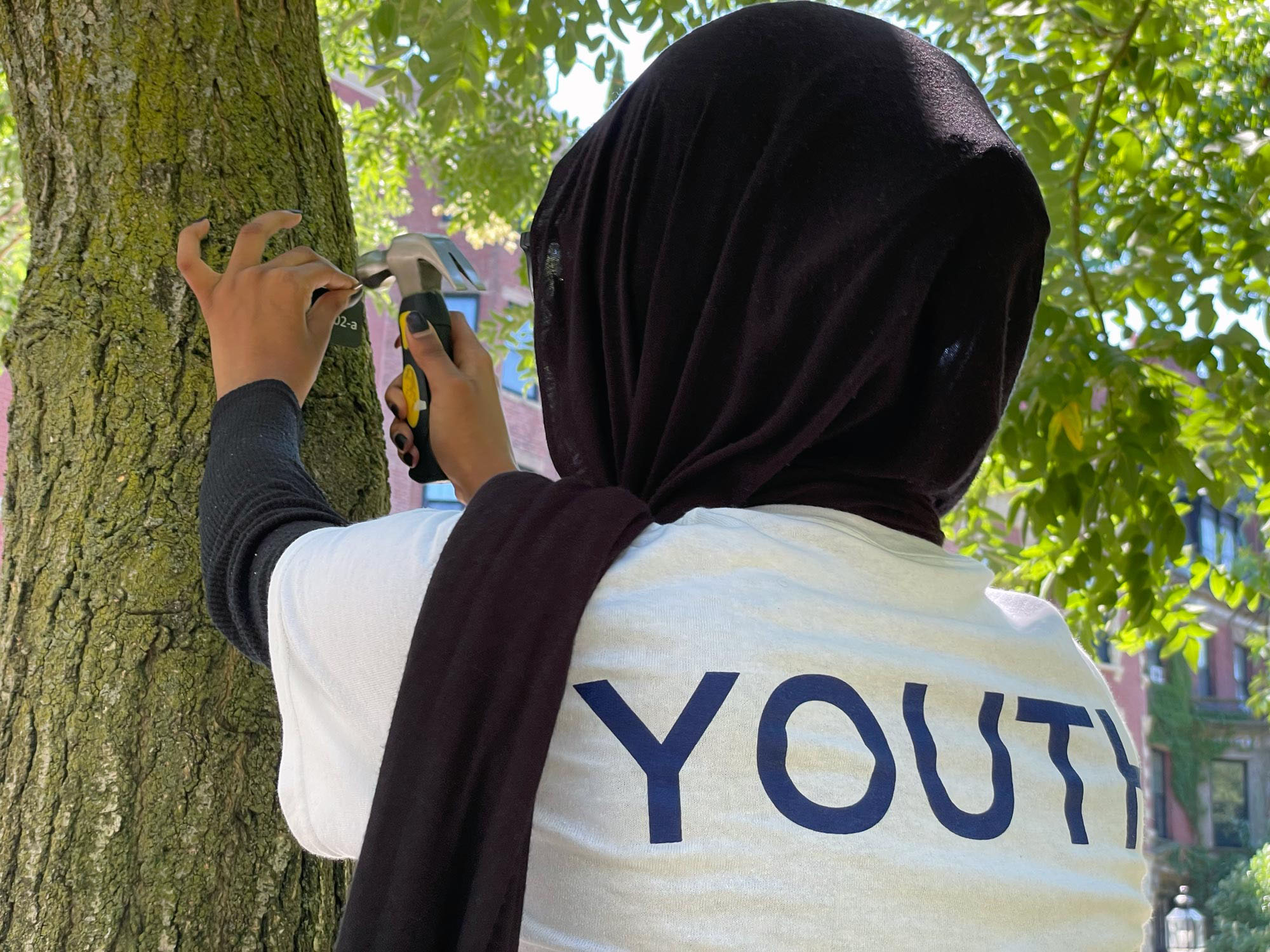Boston sees sluggish summer for connecting youth to career pathways

Sagal Yusuf (right) walks down the Commonwealth Avenue Mall with program supervisor Erin LeDrew. (Max Larkin/WBUR)
Boston boasts a large network of city-run and nonprofit programs dedicated to connecting young people with enriching summer jobs.
These positions in government, health care, business and the private sector are seen as a way to foster career skills development and offer mentorship to area teens.
But this summer, there’s a problem — those connections have been hard to forge.
As of mid-August, the city had dozens, if not hundreds, more unfilled summer jobs than it had at its pre-pandemic peak. And the reason why remains something of a mystery.
“It’s August, and none of us are dealing with students lining up outside our door, looking for jobs. That is unprecedented,” said Neil Sullivan, executive director of the Boston Private Industry Council, which runs a summer jobs program in partnership with Boston Public Schools.
The prolonged disruption is cause for concern among city leaders who see professional work experience as both a vital part of education and as a first step toward a fulfilling career.
Some students may simply be seeking downtime this summer after a difficult few years of the pandemic. But another explanation could be economics. Some young people, Sullivan says, may be lured away by the prospect of higher wages or longer hours — meaning bigger paychecks — in retail or grocery jobs.
With the labor market running hot nationwide, there is no question that workers of all ages are in high demand. Sullivan says you can witness it at any grocery store on Morrissey Boulevard in Dorchester: namely, “they are filled with teenage employees.”
Rashad Cope, director of the city’s Department of Youth Engagement and Employment, notes that stores like Target are paying up to “$18 or $19 an hour for a high school student.”
“Young people have options,” he said.
And that means many can earn more than they would in a higher-profile internship which, even if competitively paid, would offer fewer hours.
The difference is not trivial, says Sullivan.
“For 70% of our Boston public high school population, the job is [helping with] family income,” he said. “And that choice between short-term family income and potentially transformative experience, career exposure … that’s a brutal choice.”
Sullivan notes that most of the summer jobs that were offered only virtually a year ago are almost fully back in-person.
Still, the summer didn’t feel like a return to normal. In total, Sullivan says, 108 of the Council’s private-sector jobs went unfilled — nearly double the rate from last year.
Cope, on the other hand, estimates that his office and other organizations have filled roughly 4,000 total youth jobs this summer — as many, or more, than last year.
A summer well-spent
For teens across the city who have gravitated toward the city’s network of jobs, the experience has been rewarding.
Andres Lopera, a rising senior at East Boston High School, decided to spend his summer in a lab at Vertex Pharmaceuticals’ Seaport headquarters, even though he wants to be a pilot, not a scientist.
Still, Lopera says it was a summer well-spent: “I think I could apply those values that I’d learned into, like, my career: how to be more organized or, if something doesn’t go my way, how to find a solution.”
Sagal Yusuf of Dorchester, a rising sophomore at the John D. O’Bryant School of Math & Science, spent six weeks downtown as an intern for the Friends of the Public Garden.
She hammered identifying tags into trees on the Commonwealth Avenue Mall, met with city counselors and learned about the conservation of plants and public art. She earned $15 an hour, which will go toward helping her family and to buying books.

Sagal Yusuf hammers an identifying tag into a tree on the Commonwealth Ave. mall. (Max Larkin/WBUR)
But Yusuf also learned a new love for parks she hadn’t realized before this year.
“I like being outside more,” Yusuf said. “I wanted to get more vitamin D. And the parks are so pretty.”
In this first year of their program, Friends of the Public Garden had room for eight student workers this summer, but they wound up with four — the theme of the summer playing out on a small scale.
Shortage of supervisors
Young people and their families are only one side of the equation.
There’s another wrinkle to the situation: Some hiring organizations have a shortage of supervisors working on-site to manage and help young people thrive.
Ron Marlow runs the SummerWorks program at Action for Boston Community Development, which oversees hundreds of jobs at area nonprofits for Boston and Medford residents ages 14 to 21.
In mid-August, his program had 100 or so unfilled jobs and a waitlist of teens, due in part to high student interest and “a shortage of work sites” staffing enough in-person adult supervisors. He also noted that employer vaccination requirements may play a role in Suffolk County, where only 57% of 16- to 19-year-olds are fully vaccinated.
Both Sullivan and Marlow say they’ll have to talk to students this fall to identify what mix of factors was behind a sluggish summer. And after two disrupted years, both are sensitive to a sense of exhaustion among the young people they’re trying to reach.
Lopera, the East Boston rising senior, agreed that after months of pandemic schooling, some of his classmates didn’t have the drive to take on an extra challenge this summer. But many still worked, he notes.
“I had a bunch of friends who joined the Army. I had a bunch of friends that worked in a restaurant,” Lopera said. When it comes to the city jobs, he adds, “I don’t think it was more of people not wanting to do it, but they didn’t know about the opportunities.”
This story was originally published by WBUR, a partner of the New England News Collaborative.
